The JICA Chair lecture series on the Japanese modernization experience was recently held at Fakultas Ilmu Pengetahuan Budaya (Faculty of Humanities) at Universitas Indonesia (University of Indonesia), the oldest educational institute in Indonesia. Since 2021, the university has been fostering future leaders in fields such as the country's politics, diplomacy, and economy. In May 2023, Watanabe Hiroshi, the President of the Institute for International Monetary Affairs, delivered a lecture on Japan's development in the fiscal and monetary field. The lecture was attended by a total of 100 students—online and offline. The following is a report on President Watanabe’s lecture, interview, and the testimonials of students who attended the lecture.
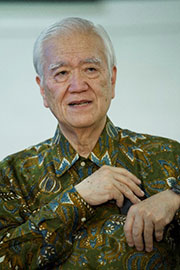
Watanabe Hiroshi: President of the Institute for International Monetary Affairs
Accreditation of the lecture series as an official university program
Three Japanese lecturers delivered lectures as part of the JICA Chair lecture series, that was held from February 2023 to June 2023. The lecture series was accredited as an official program of the Faculty of Humanities at Universitas Indonesia, and students who attended the series earned necessary credits.
The lecture series comprised 3 of a total of 15 chapters of the DVD teaching material "Japanese Modernization Lecture Series," which was produced in collaboration with the Open University of Japan. Students watched the corresponding DVD chapter and participated in a group discussion before attending each lecture. A week following the lecture, the students delivered presentations.
Similarly, students gained knowledge by watching the DVD material, “Japanese Modernization Lecture Series Chapter 13. Modernization in Japan-The Fiscal and Monetary Field” and engaging in a group discussion before President Watanabe’s lecture. Since this material covered Japan's fiscal and monetary development from the late Edo period to the end of the 20th century, the lecture focused on finance over the past 30 years, as a continuation of the material covered in the DVD. Discussions and question-and-answer sessions followed the lecture.
Prioritizing strengthening of the domestic system based on domestic customs
President Watanabe emphasized the importance of balancing the establishment of a domestic system and adapting to global trends for the purpose of developing an effective financial system. He adds, "For financial development, it is important for each country to first strengthen its existing system based on the domestic rules and customs, and then proceed with internationalization. If internationalization is prioritized over deepening of the domestic system, the country will easily be swayed by global trends.”
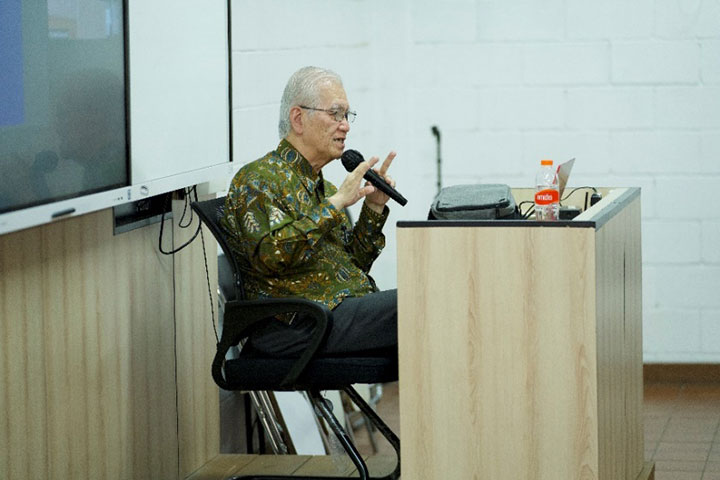
President Watanabe Hiroshi speaks to students at Universitas Indonesia about what has happened in global markets over the last 30 years
Due to this reason, chapter 13 of the DVD material starts with Japan's financial development from late Edo period. President Watanabe wants students to learn that Japan’s successful development stems from its own history. "It doesn't mean that developing countries should copy the Japanese experience. The world has become increasingly diverse, and there should be many ways of achieving development. I hope that the Japanese modernization experience is referenced as one of many options,” he muses.
Several lecture participants were from the Faculty of Humanities, and not all of them were studying finance. However, these students were highly motivated to learn about the Japanese experience, according to President Watanabe. He provided them with 124-page-long additional materials, to deepen their understanding of Japanese finance. He adds, "I told them that I would visit Indonesia again, anytime, to teach them."
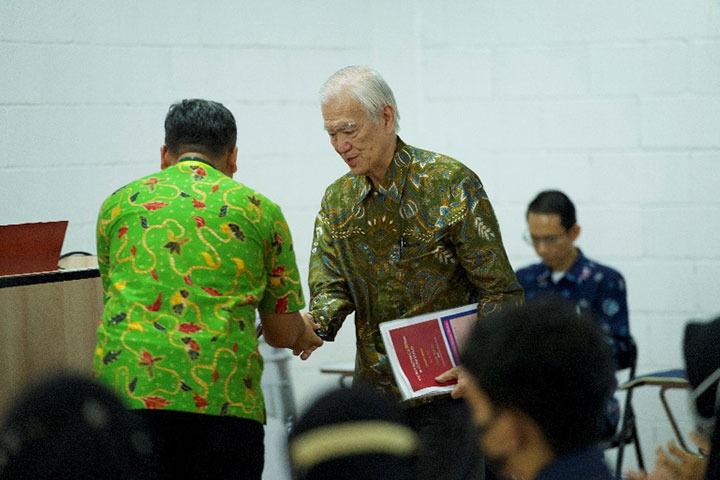
President Watanabe Hiroshi being introduced to the students by the facilitator of the lecture
Broadening perspectives: Learning from one example
JICA Chair shares Japan's development experience with developing countries not only from the perspective of fiscal and monetary development, but other perspectives as well. President Watanabe recognizes the significance of the JICA Chair and says, “JICA Chair can help developing countries make the most appropriate decisions for the development of their own countries, by sharing the Japanese modernization experience." He also adds, "I would like students of different majors to take JICA Chair programs. Learning about one example will broaden your perspective and may help you find other options.”
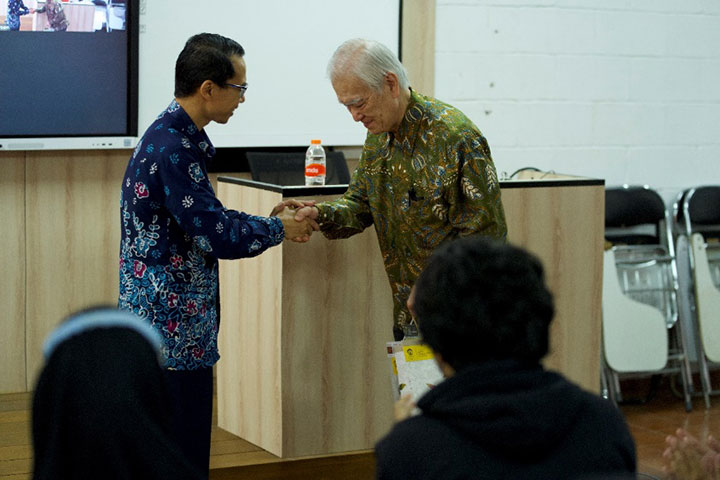
The Vice Dean for Education and Student Affairs, Universitas Indonesia, welcomes President Watanabe Hiroshi
JICA Chair began in 2020 and has been conducted in 71 countries (as of June 2023). President Watanabe looks forwards to the future expansion of JICA Chair and suggests maintaining connections with developing countries as much as possible, through online lectures and sharing of development experiences, not only between Japan and a partner country, but with multiple countries including neighboring countries, to facilitate mutual learning. He strongly hopes that Japanese students also learn more about their own country and inculcate a greater interest in studying and working abroad through collaborations with Japanese universities, via the JICA-DSP program and from the DVD teaching material.
JICA Chair supports further learning and future careers for prospective students.
We asked the students and faculty members from Fakultas Ilmu Pengetahuan Budaya (Faculty of Humanities) and Fakultas Ilmu Sosial dan Politik (Faculty of Social and Political Sciences) at Universitas Indonesia—who attended and coordinated the series of lectures given by JICA Chairs, respectively—about their impressions of this series.
Ms. Thalia Francesca Prasetyo, who has a strong interest in Japanese studies and international relations, says, “This course certainly motivated me to start implementing actions to broaden and deepen my knowledge and understanding about Japan and Indonesia’s relationship. The lectures also convinced me that I have been on the right track and that it is in line with my plan of career after I graduate. I am passionate about Japanese studies and international relations, so I will take up further studies and immersive experiences with any issues related to Japan, especially its culture, tradition, language, and people. I believe that it will support me in working for both Indonesia and Japan to reach a better understanding between the two nations and its people. I want the youth of Indonesia and Japan to work together to make a brighter future for the next generation by broadening our horizons, strengthening our ties, implementing new ways to bring good to both the societies, and collaborating with other nations for a better future.”
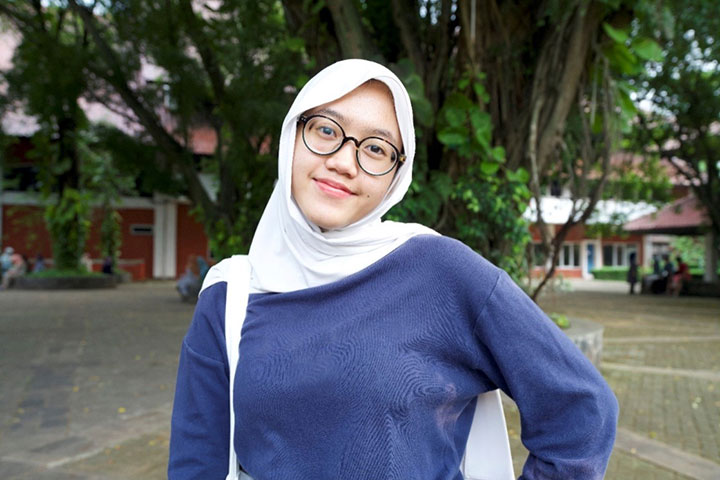
Ms. Thalia Franceska Prasetyo, student at Fakultas Ilmu Pengetahuan Budaya, Universitas Indonesia, talks about her experience of the JICA Chair lectures
Mr. Agil Mustaqiim says, “The course has broadened my understanding of Japanese politics and the historical and social factors that have shaped Japan's development. Additionally, it has also improved my understanding of the complexities of international relations and their impact on the Japanese society. By expanding my knowledge through these lectures, I wish to promote a forward-thinking mindset, advocate for innovation and adaptability, and actively seek opportunities to connect and collaborate with other countries. I would like prospective students to know that the JICA Chair program offers a once-in-a-lifetime opportunity to broaden horizons, foster meaningful connections, and contribute to the advancement of our country. I wholeheartedly recommend the JICA Chair program to my friends, family members, and relatives.”
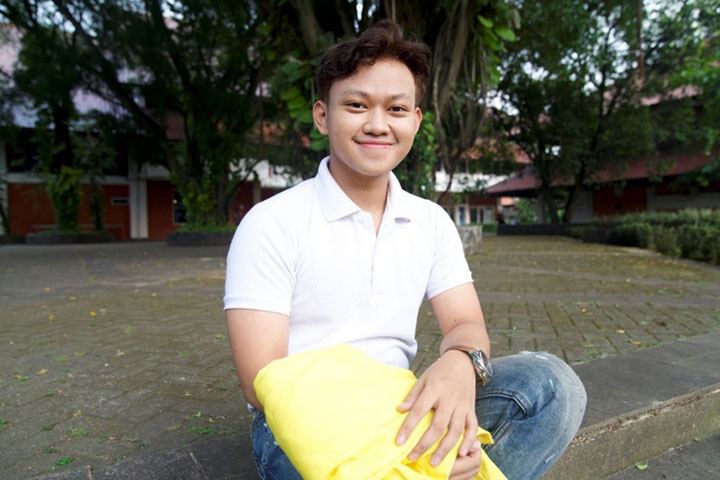
Mr. Agil Mustaqiim, student at Fakultas Ilmu Sosial dan Politik (Faculty of Social and Political Sciences), Universitas Indonesia, speaks about how the JICA Chair program can help students and have a major impact on the societ
Dr. Himawan Pratama says, “In collaboration with JICA, the Japanese Modernization Course has given students access to some of the most significant narratives from authoritative experts in the field. Students can benefit from this as they prepare themselves to become contributing figures in maintaining the Japan-Indonesia friendship. The Japanese Modernization Course’s topics, which range from Japan's emergence as a modern state to post-war developments, have in many ways sparked our curiosity and critical thinking. The topics have served as a starting point for reflective discussions about the relationship between Japan and Indonesia in the past. At the same time, they also trigger constructive discussions on how the two nations can collaborate in various field in the future.”
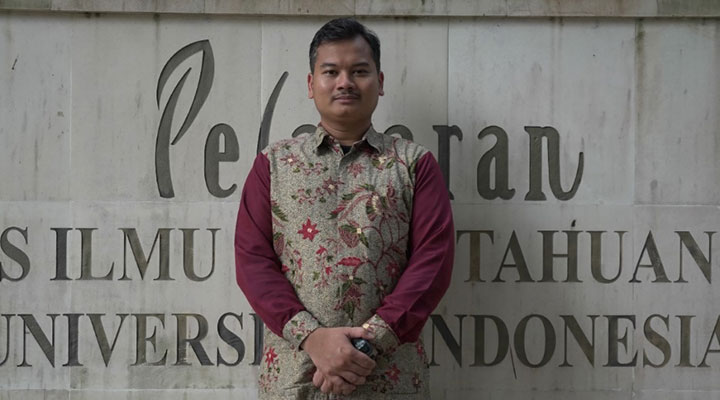
Dr. Himawan Pratama, faculty member at Fakultas Ilmu Pengetahuan Budaya, Universitas Indonesia, tells us how the JICA Chair program can help Indonesia and its future leaders
According to Dr. Rouli Esther Pasaribu, “It's a new experience, and I have a lot to learn. The JICA team is cooperative and always willing to help. Besides, we have seen an increase in student interest in Japanese studies, their active participation in lectures to delve deeper into and further explore their understanding of the subject. From what I can tell, it is a really good program for which our university can collaborate with JICA. Our students have the opportunity to interact with Japanese lecturers and learn about the history of Japanese modernization from experts from Japanese universities. I think that the collaboration between JICA and Faculty of Humanities Universitas Indonesia has created an open space for us to understand, talk, and think critically about the relationship between Indonesia and Japan, and what we can do right now to make the relationship between both countries more sustainable and fruitful in the future.”
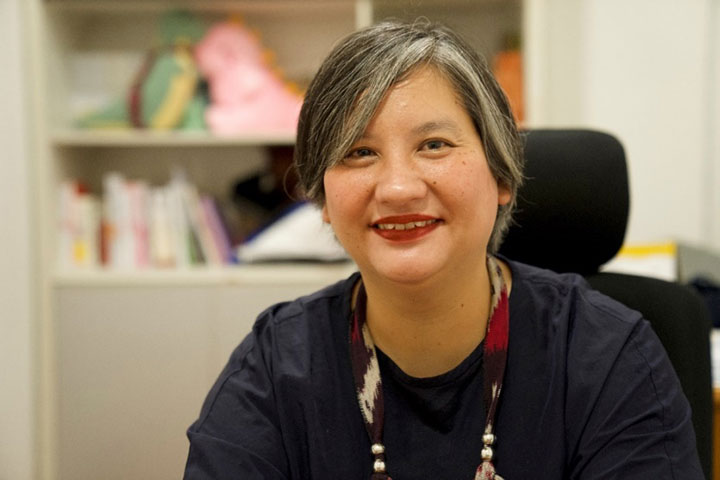
Dr. Rouli Esther Pasaribu, Education Manager and lecturer at Fakultas Ilmu Pengetahuan Budaya, Universitas Indonesia, talks about how the lectures on Japan’s development history can enrich the students’ knowledge




scroll